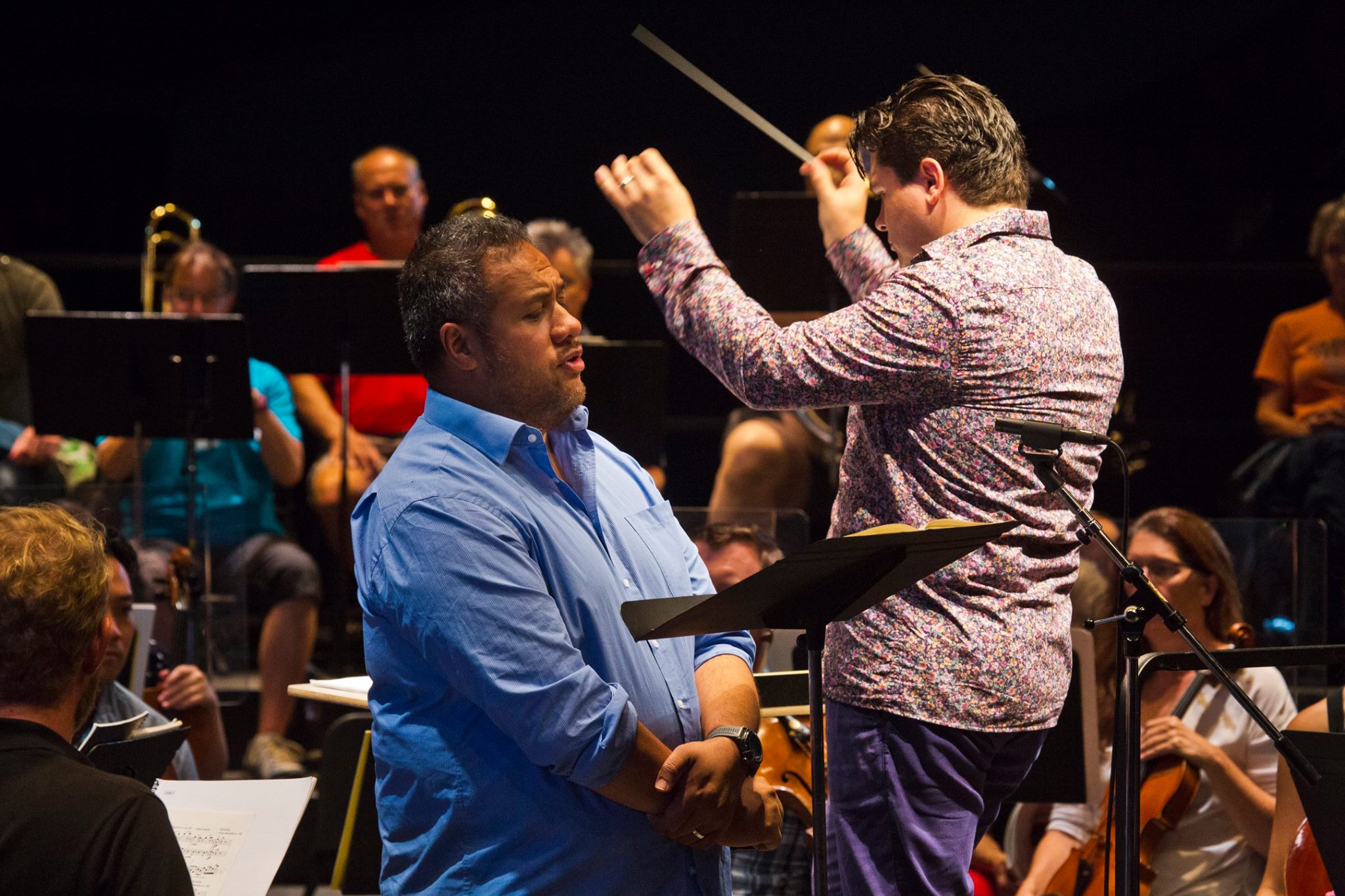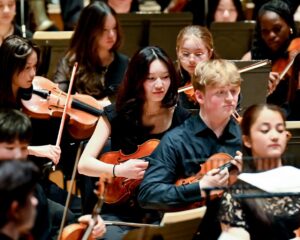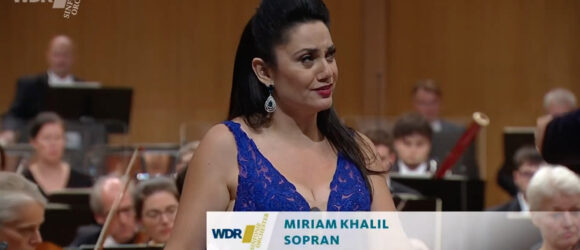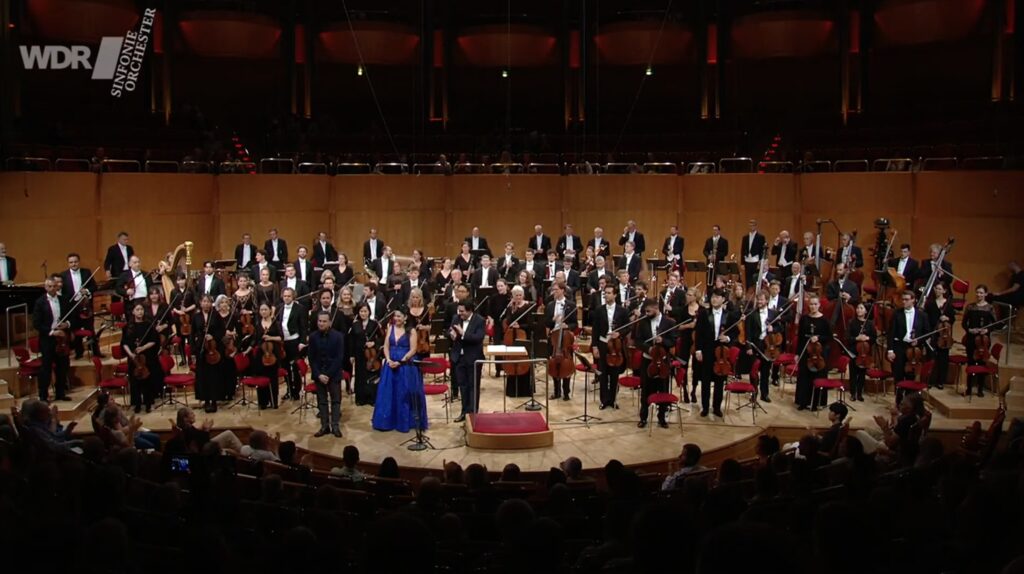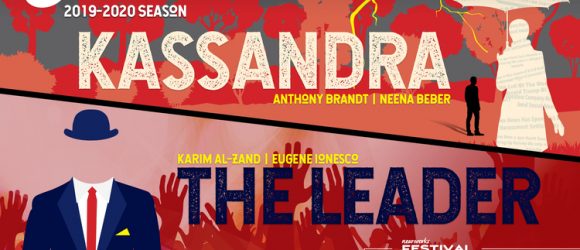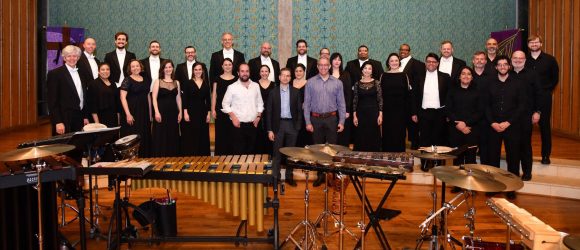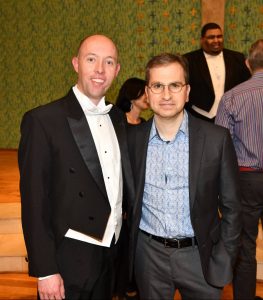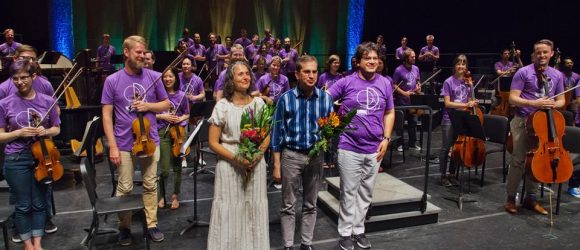National Youth Orchestra of Great Britain performs City Scenes
- On January 06, 2026
- By alzand@rice.edu
- In EVENTS, News, Performances, Reviews/Press
 0
0
The National Youth Orchestra of Great Britain, under conductor Alexandre Bloch, kicked off their Shimmer tour—a program which includes City Scenes—with a performance at the Barbican Center on January 5th. Concerts in Warwick Centre (January 6) and Nottingham Royal Concert Hall (January 7th) will follow. Reviewers from The Guardian, Times and Telegraph tripped over themselves to compare the music to dead composers they have ready notions about (America + Orchestra + Jazz = Bernstein!). UPDATE more reviews: reviewsgate.com and A Young(ish) Perspective. PLUS three, more reviews.
“The Bernstein-brash, neon blare of Karim Al-Zand’s 2006 City Scenes introduced new swagger, a cheeky little phrase hopping around the orchestra like a sonic Artful Dodger, and strings and harps a gleaming foil to streetwise brass and woodwind.”
The Guardian
“…urban, Bernstein-ish sound of City Scenes, by Tunisian-born American composer Karim Al-Zand was a breeze, and the delicately “wrong-note” solos from a handful of violins in the dreamy slow movement had a deliciously louche quality.”
The Telegraph
…with plenty of chewy textures for the players — and some nifty solo work slickly delivered by the orchestra’s leader Aki Blendis — and driven rhythms that have a hint of Shostakovich, but a Shostakovich who has been airlifted from Moscow and taken to Miami for a weekend.
The Times of London
CBC Radio Canada Feature: The Revelation Hour
- On June 10, 2025
- By alzand@rice.edu
- In News, Reviews/Press
 0
0
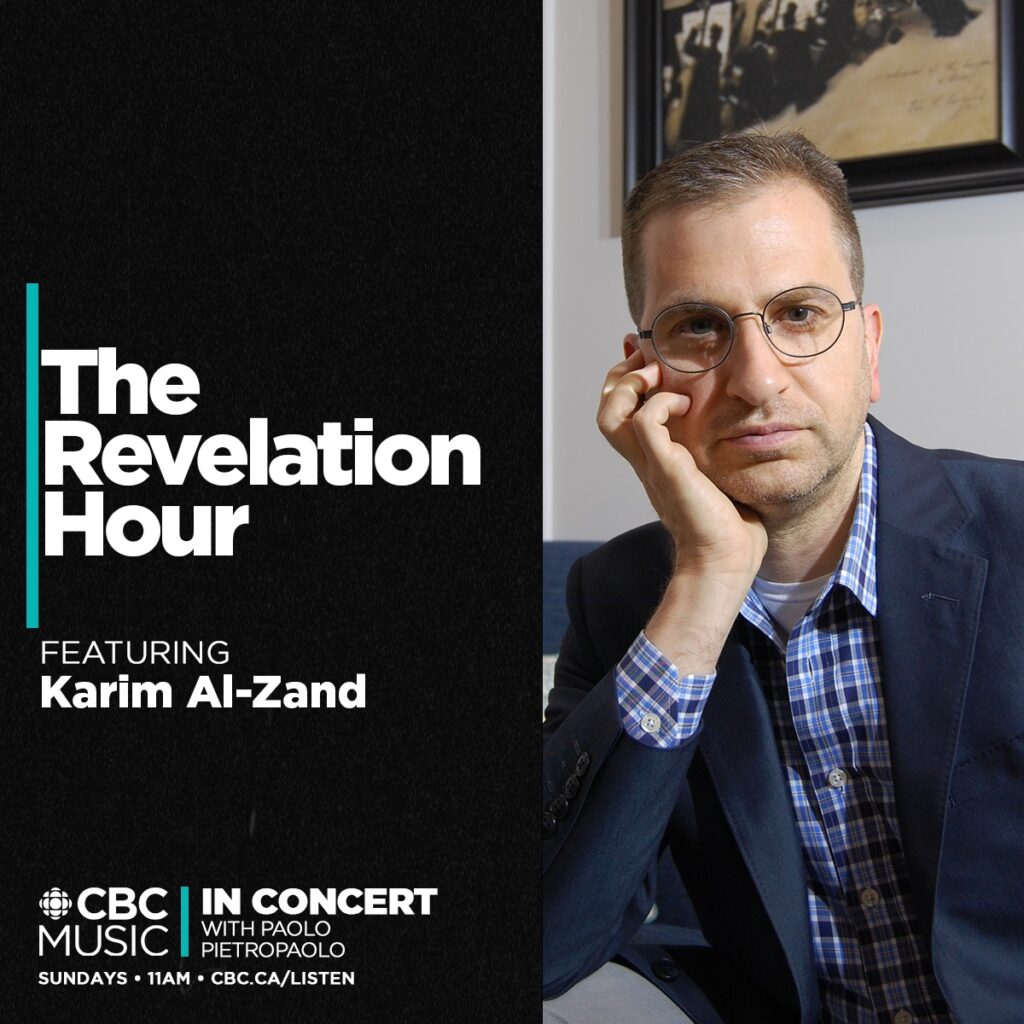 The June 7-8th edition of CBC Radio Canada’s In Concert, broadcast nationally and hosted by Paolo Pietropaolo, will include a feature on my music as its The Revelation Hour. Now available free on demand. The broadcast includes performances of Six Bagatelles, Visions from Another World, Paganini Reverie and Al Hakawati.
The June 7-8th edition of CBC Radio Canada’s In Concert, broadcast nationally and hosted by Paolo Pietropaolo, will include a feature on my music as its The Revelation Hour. Now available free on demand. The broadcast includes performances of Six Bagatelles, Visions from Another World, Paganini Reverie and Al Hakawati.
Musiqa Welcomes New Board Member Maiko Sasaki
- On June 10, 2025
- By alzand@rice.edu
- In Musiqa, News, Reviews/Press
 0
0
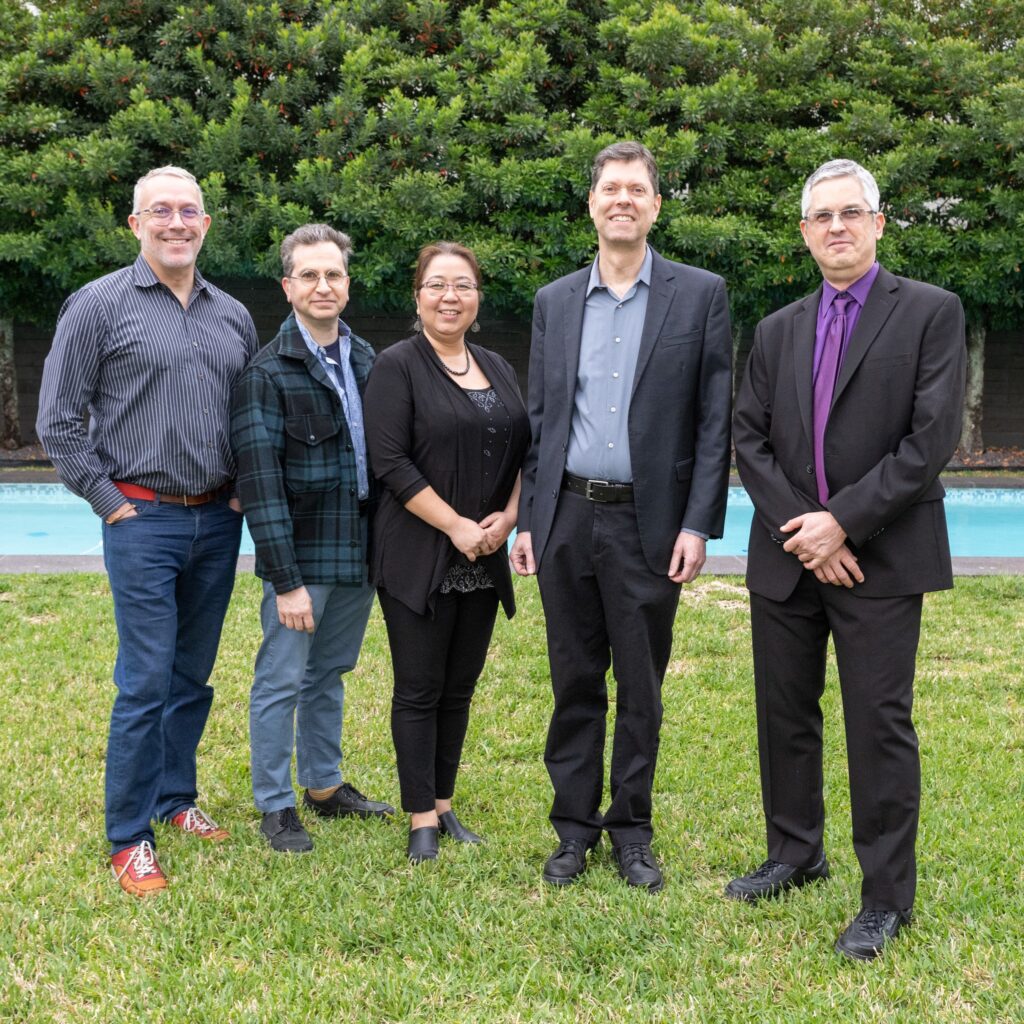 Musiqa Artistic Board (L to R): Marcus Maroney, Karim Al-Zand, Maiko Sasaki, Pierre Jalbert, Anthony BrandtMusiqa is proud to welcome Maiko Sasaki to our artist board! Maiko is a distinguished clarinetist known for her dynamic performances as a soloist, chamber musician, and orchestral player. A regular performer onstage with Musiqa, she joins founding artist board members Karim Al-Zand, Anthony Brandt, Pierre Jalbert and Marcus Karl Maroney in their ongoing quest to bring adventurous and inspiring programming to our audiences.
Musiqa Artistic Board (L to R): Marcus Maroney, Karim Al-Zand, Maiko Sasaki, Pierre Jalbert, Anthony BrandtMusiqa is proud to welcome Maiko Sasaki to our artist board! Maiko is a distinguished clarinetist known for her dynamic performances as a soloist, chamber musician, and orchestral player. A regular performer onstage with Musiqa, she joins founding artist board members Karim Al-Zand, Anthony Brandt, Pierre Jalbert and Marcus Karl Maroney in their ongoing quest to bring adventurous and inspiring programming to our audiences.
Moveable Do podcast interview
- On December 07, 2024
- By alzand@rice.edu
- In News, Reviews/Press
 0
0
An interview from the most recent episode of Moveable Do podcast, hosted by Steve Danielson.
Al Hakawati Receives European Première
- On October 01, 2024
- By alzand@rice.edu
- In EVENTS, News, Reviews/Press
 0
0
Al Hakawati received its European premiere on September 22 at the Kölner Philharmonie, in a performance by soprano Miriam Khalil and the WDR Symphony Orchestra, under the direction of Cristian Măcelaru. Also on the program was Shostakovich’s Cello Concerto No.1 ( Sheku Kanneh-Mason), and Rimsky Korsakov’s Scheherazade, Op. 35. Al Hakawati is a co-commission of the Cabrillo Festival of Contemporary Music, WDR Sinfonieorchester Köln and the Orchestre National de France.
Al Hakawati (The Storyteller) presents fragments from an opera-in-progress entitled The Book of Tales. The opera is inspired by a recent discovery about a beloved story collection, the so-called “Arabian Nights.” The exact provenance of these medieval Arabic tales, properly known as Alf Laylah wa-Laylah [One Thousand and One Nights], has always been something of a mystery. That all changed in 1993 when a forgotten 18th century Arabic manuscript was found in the Vatican library. It was a travel memoir written by a 75-year-old Syrian storyteller named Hanna Diyab. In 1707, the young Diyab had embarked on an extraordinary, years-long journey to Europe. His incredible adventures culminated in a meeting with the Sun King, King Louis XIV, in the halls of Versailles. Diyab told his entrancing stories to everyone he met in his travels, including to Antoine Galland, a translator and archaeologist in Paris. It was Galland who, in 1710, first introduced Western readers to the stories of Ali Baba and Aladdin in Les Mille et une Nuits—though Galland makes no mention of the storyteller. Diyab returned to Syria in 1709 and eventually became a successful cloth merchant in Aleppo.
He seems to have had no idea how far his captivating stories had travelled.
The opera connects stories and storytellers across time and place: from the present day, to the Ancien Régime of France, to the imaginary world of Scheherazade. And, though the “frame story” is Diyab’s, the most significant characters in the story are women. The fragments in Al Hakawati comprise four “scenes” that feature the opera’s three principal female characters.
2024 Barlow Prize
- On August 30, 2024
- By alzand@rice.edu
- In News, Reviews/Press
 0
0
 The Barlow Endowment for Music Composition at Brigham Young University proudly announces the Barlow Prize recipient for 2024.
The Barlow Endowment for Music Composition at Brigham Young University proudly announces the Barlow Prize recipient for 2024.
After reviewing 384 submissions from 47 countries, the judging panel awarded Karim Al-Zand the $15,000 Barlow Prize to compose a major new work for organ, to be premiered by a consortium of performers which will include Chelsea Chen,  Don Cook, Janette Fishell, and Bradley Hunter Welch.
Don Cook, Janette Fishell, and Bradley Hunter Welch.
Known for his “strong and startlingly lovely” music (Boston Globe), Canadian-American composer Karim Al-Zand’s compositions span a wide range of influences and inspirations. His diverse portfolio includes solo, chamber, vocal, and orchestral works that draw from a rich tapestry of sources such as graphic art, myths, world folk music, and his Middle Eastern heritage. With accolades including the ArtSong Prize and the Arts and Letters Award in Music, Al-Zand’s innovative compositions continue to leave a significant mark internationally. A founding member of Musiqa, Houston’s premier contemporary music group, Al-Zand is a Professor of Composition and Theory at Rice University’s Shepherd School of Music.
Balourdet Quartet performs Strange Machines in Summer Season
- On June 28, 2023
- By alzand@rice.edu
- In EVENTS, News, Reviews/Press
 0
0

The Balourdet Quartet will include Strange Machines in their summer season with performances at festivals including:
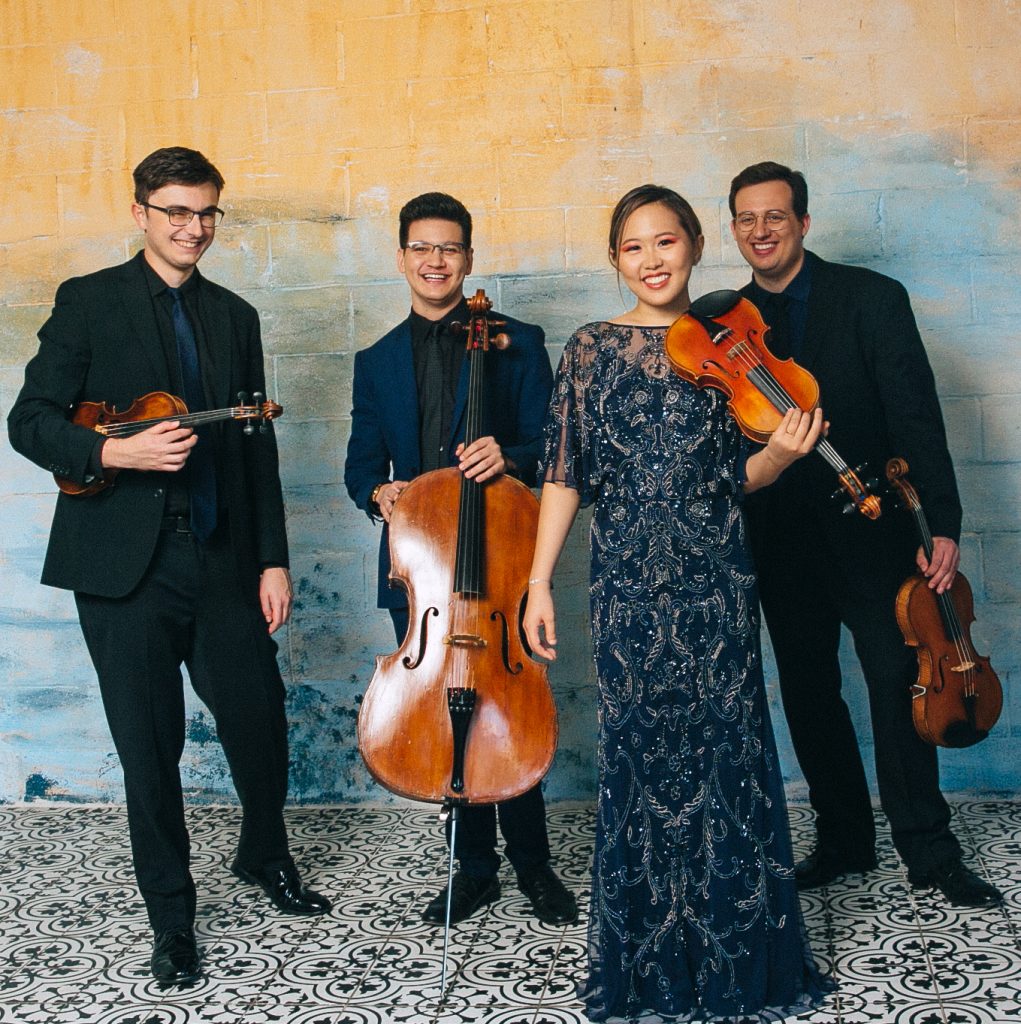
Taos School of Music Chamber Music Festival
Rockport Chamber Music Festival
Green Lake Festival of Music
Honest Brook Music Festival
Music Mountain Summer Festival
Green Mountain Chamber Music Festival
Nantucket Musical Arts Society
Portsmouth Athenaeum Chamber Music Series.
The Boston Musical Intelligencer reviewed their recent performance at Rockport.
The Leader CD reviewed in Opera News
- On March 28, 2023
- By alzand@rice.edu
- In News, Reviews/Press
 0
0
 The recent CD release The Leader and other works (Navona Records NV6469) was reviewed by Joshua Rosenblum in the February 2023 issue of Opera News.
The recent CD release The Leader and other works (Navona Records NV6469) was reviewed by Joshua Rosenblum in the February 2023 issue of Opera News.
Canadian-American composer Karim Al-Zand demonstrates how relevant a one-act French political satire from 1953 can be. His short chamber opera The Leader is based on Eugène Ionesco’s Maître, in which, according to the notes, “The characters worship a buffoonish ‘great man.’” The play, we’re also told, is a “trenchant commentary on the casual rise of tyranny.” Ionesco’s pointed absurdities are surprisingly pertinent but also not nearly caustic enough to parody today’s America. But it’s clear why Al-Zand felt inspired to musicalize it.
Not much happens in the ten scenes of this thirty-five-minute work, which is partly the point. Most of the satire comes from the mindless repetition of certain phrases. “There he is! There he is! There he is! At the end of the street! There’s the Leader! He’s coming nearer, nearer, nearer,” sings the Announcer (Mark Diamond) at the beginning of the first track, “It’s Better If He Doesn’t See Us,” and then, at the end, “Hooray! The leader! Long live the leader! Too bad! He’s going away.” He’s joined in his sycophantic commentary by two Admirers amid a cheerfully pulsing musical texture, featuring a swirling figure for the solo woodwinds and a pungent, Poulenc-like harmonic language that proves a good match for Ionesco’s mocking aesthetic. Diamond is artfully unctuous in his grand, vacuous pronouncements; Megan Berti and Aidan Smerud echo him with pleasant (and alarming) brainlessness, particularly in the fourth track, in which their rapid-fire parroting of the Announcer’s phrases turns briefly into a laughing song.
Ionesco also provides a love story, in his characteristic absurdist fashion: the couple falls instantly in love after affirming that they don’t know each other and therefore have something in common. Al-Zand captures the deadpan drollery and gives it life with a fresh, piquant musical language and earnest, melismatic, self-mocking declamations. The short scene soars briefly into a lyrical love duet, allowing soprano Lindsay Russell Bowden and tenor Zach Averyt to flex their operatic chops while highlighting the silliness of love at first sight.
In later scenes, mini episodes are given over to the ridiculous: “They’ve given the leader’s trousers back! He puts them on!” and “The leader’s sucking his thumb!” This kind of thing could wear thin in less skilled hands, but Al-Zand provides continuous musical invention, including a fast, off-kilter jig in seven (2+2+3), breakneck orchestral skittering, a chorale with crunchy harmonies and a militaristic march that implies incipient creeping Fascism. The Leader had a full staging in February 2020, but it’s easy to imagine successful concert performances as well. The eleven-piece ensemble, led with precision by Eiki Isomura, gives a crackerjack rendering of the virtuoso score.
Also included here is Songs From the Post TruthEra,a setting of three poems combined into a single continuous piece,which promises more skewering of ripe targets, though it doesn’t draw quite as much blood as one might hope. The first poem, Charles Lamb’s “Incorrect Speaking” (1809), is an admonition to a young girl and contains lines such as “Study well the sense of each / Sentence, lest in any manner / It misrepresent the truth.” The second two poems are mashups of words and phrases from Lamb, a technique Al-Zand calls “vocabularyclept.” These fractured texts (intentionally) make less and less sense as they proceed, and Al-Zand accordingly puts soprano Alexandra Smither through vocal calisthenics of ever-increasing difficulty—all of which she aces—amid her character’s mounting hysteria. Bassoonist Ben Roidl-Ward, the sole accompanist in this unusually scored piece, is an equal partner and matches Smither’s remarkable expressive prowess.
Three instrumental sets round out this impressive collection from a composer who deserves wider recognition—Six Bagatelles for piano trio, with color-oriented titles such as “Mezzotint in Indigo” and “Gauloises Bleues”; two of Al-Zand’s Capriccios for solo violin; and Stomping Grounds, a four-movement work for clarinet, violin and piano, whose jazzy and harmonically original last movement sounds like ragtime put through a blender. The two solo capriccios are challenging but idiomatic showpieces, with blistering performances by violinists Sonja Harasim and Matthew J. Detrick respectively, both delivered with considerable expertise and outstanding intonation. —Joshua Rosenblum
The Cleveland Orchestra plays Lamentation on The Disasters of War
- On October 18, 2022
- By alzand@rice.edu
- In EVENTS, News, Reviews/Press
 0
0
The Cleveland Orchestra performed Lamentation on The Disasters of War as part of their 2022–2023 season, under conductor Nikolaj Szeps-Znaider on October 13-16 in Severance Hall. The program featured Beethoven’s Symphony No. 3 Eroica and Bloch’s Schelomo: Rhapsodie Hébraïque for Violoncello and Orchestra. The theme of the concert, as expressed by David Patrick Stearns in his notes for the concert:
“Music created in times of war so often comes down to the question “Why?” On one level, we question the politics of war, an often confusing and complex web of governmental policies and prejudices. On another is the heartbreaking bloodshed and loss of soldiers and civilians. Why do we so often turn to music and art during these troubled times? Why can a tone poem, symphony, or concerto more clearly express what can be communicated in words, or, more to the point, beyond words.
The three composers on this program each confront — and transform — the question of “why” through pre-established musical forms. Karim Al-Zand’s Lamentation on The Disasters of War (2006) finds renewed resonance in Francisco de Goya’s tortured 19th-century etchings of Napoleon’s invasion of Spain; Ernest Bloch’s World War I–era Schelomo, Hebraic Rhapsody for Cello and Orchestra (1916), invokes the Old Testament wisdom of King Solomon; and Beethoven’s Symphony No. 3 (1803–04) finds inspiration — and later criticism — in the conquests of Napoleon. In contemplating war, they illuminate dual sides of humanity: not only to endure through unimaginable hardship, but to find meaning, purpose, and eventually beauty in it.”
The program was also featured by Szeps-Znaider in his role as director of the Orchestre National de Lyon. [reviews: Cleveland Plain Dealer; Seen and Heard International]
Saint Louis Symphony plays Luctus Profugis
- On November 01, 2021
- By alzand@rice.edu
- In News, Reviews/Press
 0
0
The Saint Louis Symphony performed Luctus Profugis on a recent program of music on the theme of “homeland.” The concert was also radio broadcast and streamed on St. Louis Public Radio’s Classic 107.3 FM.  The program, conducted by Nikolaj Szeps-Znaider, featured Smetana’s Má vlast and Robert Schumann’s Piano Concerto with soloist Ingrid Fliter. Written in 2015, Luctus Profugis reflects on the European migrant and refugee crisis during that period. The work is scored for string orchestra and vibraphone.
The program, conducted by Nikolaj Szeps-Znaider, featured Smetana’s Má vlast and Robert Schumann’s Piano Concerto with soloist Ingrid Fliter. Written in 2015, Luctus Profugis reflects on the European migrant and refugee crisis during that period. The work is scored for string orchestra and vibraphone.
Capriccio FILM
- On July 13, 2021
- By alzand@rice.edu
- In Musiqa, News, Reviews/Press
 0
0
Musiqa presents a newly commissioned work by filmmaker Traci Lavois Thiebaud entitled Capriccio. Commissioned by Musiqa, Capriccio celebrates the diversity and resilience of Houston’s arts community, and features musicians, dancers, poets, painters, actors, art cars and more, all packed into a free-flowing visual collage conceived and created by Houston artist Traci Lavois Thiebaud. The filmmaker describes it as a “love letter to Houston’s artists.” The film is scored to Capriccios Nos. 1 & 6, as performed by Natalie Lin Douglas (director of Kinetic Ensemble) and Matthew Detrick (from Apollo Chamber Players). Contributors include Contemporary Arts Museum Houston, Houston Masterworks Chorus, WindSync, Apollo Chamber Players, Houston Symphony, Houston Ballet, Mildred’s Umbrella Theater Company, DiverseWorks, The Catastrophic Theatre, Ars Lyrica Houston, Stages, Loop38, Orange Show Center for Visionary Art, NobleMotion Dance, Transitory Sound and Movement Collective, Kinetic Ensemble, Dre Forgotten, Brittani Alexandra Broussard, Anastasia F. Kirages, Sara Royer, Bryan Kaplun, Casey Waldner, Erin Rodgers, Alli Partin Villines, Natalie Lin Douglas, JooYoung Choi, Charlie Scott, David A Brown, Christa Forster, Rebecca Lowe, Miranda Ramírez, Kacee Dugas, Joe Folladori, Candice D’Meza, Matt Detrick, Loren Holmes, BooTown, AFA, Muhammad Fachrul Yunus, James Templeton, James Medford, National Pleasure, Joseph Weiss, Bonnie Blue, Ken Hoge, Felizabeth Smiley, Swimwear Department, and many more….
CAPRICCIO
/kəˈprēCHēˌō/
1. A lively piece of music, typically short and free in form.
2. A style of painting introduced in the Renaissance that combines real architectural elements and figures in fictional and fantastical combinations.
3. A series of six works for solo violin by Houston composer and Musiqa Artist Board member Karim Al-Zand.
4. The film inspired by Al-Zand’s Capriccios, created by Houston filmmaker Traci Lavois Thiebaud, and involving arts organizations and artists from across the city. “Capriccio” was commissioned by Musiqa, and includes ballet dancers, actors, writers, visual artists, poets, musicians of all sorts and (of course) art cars in a celebration of Houston’s artistic diversity. A modern cinematic riff on a 17th century painting style, Musiqa’s “Capriccio” is coming this summer, for free, to your electronic device.
Dietrich Henschel and ensemble unitedberlin release CD X-mas Contemporary
- On November 28, 2019
- By alzand@rice.edu
- In News, Reviews/Press
 0
0
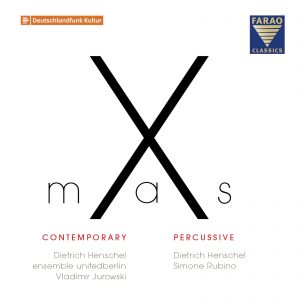 Dietrich Henschel and ensemble unitedberlin, under the direction of conductor Vladimir Jurowski have released a double CD entitled X-Mas Contemporary, featuring the premiere recordings of twelve holiday-inspired works.
Dietrich Henschel and ensemble unitedberlin, under the direction of conductor Vladimir Jurowski have released a double CD entitled X-Mas Contemporary, featuring the premiere recordings of twelve holiday-inspired works.
What does Christmas mean to you?
Baritone Dietrich Henschel asked twelve composers from different countries and cultures to create a work for voice and ensemble and to use musical means to describe what they associate with Christmas. It was up to them whether religion or tradition played a role. Even criticism and satire were possible. As expected, the answers are all very different.
X-MAS CONTEMPORARY – The Christmas Carol of the 21st Century
12 composers write 12 Christmas songs of the 21st century.
Works by
Karim Al Zand
Detlev Glanert
Manfred Trojahn
Jose-Maria Sanchez-Verdu
Vanessa Lann
Arno Waschk
Olga Rayeva
Jamie Man
Michèle Reverdy
Annette Schlünz
Jobst Liebrecht
Matan Porat
The CD release will coincide with concert performances in Berlin, Rotterdam and Dusseldorf in December, 2019. The CD is available on iTunes. The CD has earned several positive reviews already.
Opera in the Heights Announces 2019–2020 season, including premiere of The Leader
- On May 07, 2019
- By alzand@rice.edu
- In News, Reviews/Press
 0
0
Opera in the Heights has just announced its 2019–2020 line-up, which will include a collaboration with Musiqa in February 2020. As part of a new initiative, their New Works Festival will feature a double-bill of chamber opera premières on February 23rd and 29th: Anthony Brandt’s Kassandra and Karim Al-Zand’s The Leader, both conducted by OH artistic director Eiki Isomura. The libretto of The Leader is drawn from a short one-act play by French-Romanian playwright Eugène Ionesco. The work is a comic opera, an absurdist political satire about authoritarianism, groupthink and the cult of personality.
Houston Chamber Choir performs A Measure in Trance
- On April 16, 2019
- By alzand@rice.edu
- In Musiqa, News, Reviews/Press
 0
0
Visions Take Flight: new CD from River Oaks Chamber Orchestra
- On December 24, 2018
- By alzand@rice.edu
- In News, Reviews/Press
 0
0
The River Oaks Chamber Orchestra recently released its first recording: Visions Take Flight. A double CD consisting of all newly commissioned works, the recording includes Visions from Another World, a piece commissioned by the orchestra in 2008. The recording also features compositions by Derek Bermel (Murmurations), Reena Esmail (Teen Murti), Anthony DiLorenzo (Jabberwocky) and Marcus Maroney (Concerto for Chamber Orchestra). Mei-Ann Chen conducts this debut recording, produced by Grammy-winner Blanton Alspaugh on Innova Records. The recording process, which was interrupted in Houston by the arrival of hurricane Harvey, is chronicled in a short behind the scenes video introducing the CD.
“Visions Take Flight” is available at iTunes, amazon.com and ArkivMusik. Program notes are available here. Reviews of the recording have appeared in I care if you listen, BBC Music Magazine’s December podcast, Houston Public Media, Log Journal September Playlist, MidWest Record, artsfuse and Textura.
Lamentation on The Disasters of War receives European Premiere with Royal Concertgebouw Orchestra
- On November 12, 2018
- By alzand@rice.edu
- In News, Reviews/Press
 0
0
The string orchestra version of Lamentation on The Disasters of War received its European premiere in Amsterdam with the Royal Concertgebouw Orchestra under the direction of Cristian Macelaru on October 18th and 19th. It joined a program of works by Weill and Shostakovich. Reviews in NRC Handelsblad, Opera Magazine and HTodsunden Parool
Parizade and the Singing Tree premiere at Cabrillo
- On August 10, 2018
- By alzand@rice.edu
- In News, Reviews/Press
 0
0
Parizade and the Singing Tree premiered at the Cabrillo Festival of Contemporary Music at their annual Family Concert on August 5. Directed by Cristian Macelaru and narrated by Nora el Samahy, this new orchestral transcription of the work (originally for sextet) was commissioned by the festival. In addition, Luctus Profugis was performed as an unannounced addition to the Saturday August 4th concert, entitled “After Dixieland.” Reviews: San Francisco Chronicle, San Francisco Classical Voice, Performing Arts Monterey, Monterey Herald, Classical Voice North America.
ALIAS Chamber Ensemble performs Stomping Grounds
- On October 22, 2017
- By alzand@rice.edu
- In News, Reviews/Press
 0
0
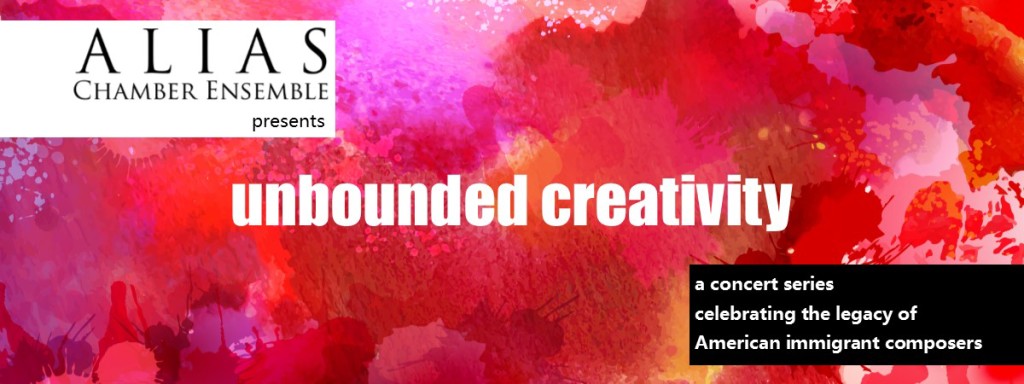 Nashville new music ensemble ALIAS will be performing Stomping Grounds on their October 24th concert entitled “Unbounded Creativity.” The concert is previewed in The Tennessean and in Nashville Scene. The performers will be Lee Levine (clarinet), Alison Hoffman (violin) and Melissa Rose (piano).
Nashville new music ensemble ALIAS will be performing Stomping Grounds on their October 24th concert entitled “Unbounded Creativity.” The concert is previewed in The Tennessean and in Nashville Scene. The performers will be Lee Levine (clarinet), Alison Hoffman (violin) and Melissa Rose (piano).
Radio broadcast of The Prisoner
- On August 17, 2017
- By alzand@rice.edu
- In News, Reviews/Press
 0
0
The final concert of the 2017 Cabrillo Music Festival, featuring The Prisoner will be broadcast on KALW Radio on September 11 (!)
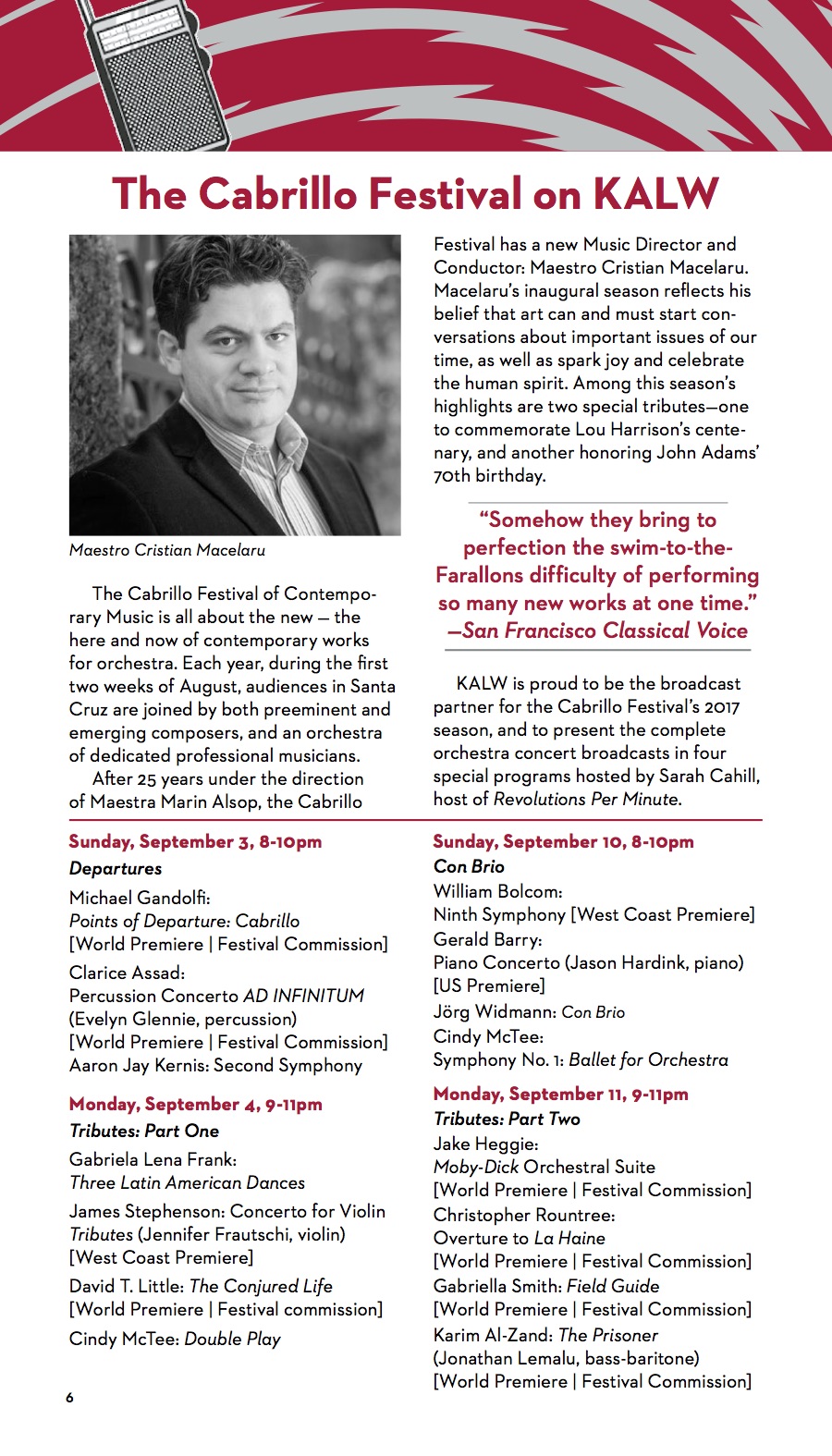
The Prisoner premiere
- On August 15, 2017
- By alzand@rice.edu
- In News, Reviews/Press
 0
0
The Prisoner enjoyed a very successful premiere on August 12 at the Cabrillo Festival of Contemporary Music, under their new music director Cristian Macelaru, and bass-baritone Jonathan Lemalu. Also on the program was an orchestral suite drawn from Jake Heggie’s Moby Dick created by Macelaru. 